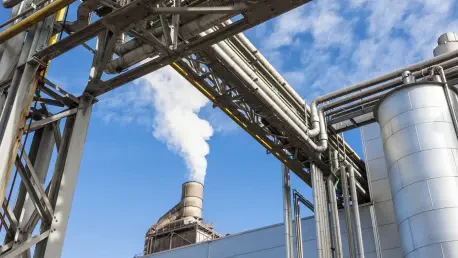The global Industrial Combustion Control Components Systems Market is on a trajectory of considerable growth, characterized by a blend of technological advancements and evolving industry needs. From 2025 onwards, this market is expected to expand from USD 15.43 billion to USD 19.1 billion by 2032, marking a compound annual growth rate (CAGR) of approximately 2.71%. This trend is set against a backdrop of increasingly stringent environmental regulations and a growing industrial demand for energy efficiency. As industries broaden their horizons in power generation, chemical manufacturing, food processing, and metal refining, the reliance on efficient combustion control systems becomes profoundly significant. These systems not only bolster operational performance but also align with the global mandate for lower carbon emissions.
Key players like Honeywell, Siemens, Emerson Electric, Yokogawa Electric Corporation, and Mitsubishi Electric are at the forefront, leveraging cutting-edge technologies and smart integrations. These technologies optimize the performance of industrial burners, boilers, and furnaces, regulating critical combustion parameters like air-to-fuel ratios, temperature, and pressure. The primary objective remains minimizing energy use while reducing emissions, making these systems indispensable. Furthermore, the deployment of components such as programmable logic controllers (PLCs), flame detectors, actuators, and advanced burner management systems ensures enhanced control over combustion processes. These innovations not only prevent potential operational hazards like explosions but also enhance the overall stability and reliability of industrial operations.
Driving Forces of Market Growth
Several converging factors are driving the growth of the Industrial Combustion Control Market, with environmental regulations playing a crucial role. Around the globe, governments are intensifying their focus on reducing industrial emissions, prompting companies to adopt advanced combustion control systems. These technologically advanced systems enable industries to meet stringent regulatory standards while enhancing operational efficiency. Integration of real-time data analytics and automated technologies in combustion controls helps industries achieve compliance goals seamlessly. Furthermore, increasing attention toward energy efficiency is encouraging the adoption of modern combustion technologies. Industries are under constant pressure to reduce fuel consumption, a challenge exacerbated by fluctuating energy prices and corporate sustainability priorities.
Emerging economies are playing a pivotal role in the expansion of this market, especially in regions like Asia-Pacific, Latin America, and Africa. In these areas, industrialization and manufacturing are rapidly advancing, necessitating effective combustion control solutions. China, India, and Southeast Asian countries are experiencing urban development and infrastructure growth, necessitating more sophisticated combustion controls. These regions highlight the dynamic interplay between industrial needs and expanding technological capabilities, further cementing the market’s foundation. Moreover, the adoption of Industry 4.0 principles, smart sensors, IoT-enabled systems, and AI-driven analytics revolutionize combustion management, offering predictive maintenance, remote capability, and process optimization crucial for maximizing productivity.
Technological Innovations and Industry Impact
Technological innovation remains a cornerstone of progress in the industrial combustion control market. These advancements include the introduction of smart sensors and IoT-enabled systems that bring transformative changes. AI-driven analytics, in particular, enable predictive maintenance and remote monitoring, allowing industries to identify and rectify potential issues before they escalate. Such proactive measures extend the operational lifespan of combustion systems and significantly reduce downtime, leading to substantial cost savings for industrial players. The integration of Industry 4.0 principles not only enhances productivity but also aligns with evolving industry standards, ensuring long-term sustainability and competitiveness.
The increasing demand for fuel flexibility is another significant trend shaping this market. Modern combustion control systems are designed to accommodate a diverse mix of fuels, including natural gas, hydrogen, biomass, and renewable sources. This adaptability supports the shift towards cleaner energy alternatives as the global energy landscape moves towards decarbonization. By enabling seamless transitions between different fuel types, these systems provide immense value to industries striving for sustainability. Additionally, the focus on flexible fuel options ensures that combustion systems remain relevant and future-proof, capable of meeting the challenges posed by changing energy dynamics.
Regional Dynamics and Challenges
From a geographical standpoint, North America and Europe remain vital markets thanks to their established industrial bases and progressive environmental policies. These regions benefit from robust infrastructure, technological leadership, and a collective emphasis on sustainability. However, it’s the Asia-Pacific region that is seeing the most accelerated growth due to its rapid industrialization and urban development. Government initiatives in this region are proactively supporting energy efficiency and emissions reduction efforts, creating an immensely fertile ground for the market. As focus amplifies on reducing environmental impact, companies in these regions are increasingly investing in advanced combustion control systems.
Despite promising growth opportunities, challenges persist within the industry. The significant upfront costs of adopting advanced combustion control technologies can deter smaller enterprises from transitioning to updated systems. Integrating these state-of-the-art solutions into existing infrastructure requires considerable resources and time, posing a dilemma for many businesses. However, these challenges also create avenues for suppliers to innovate through scalable, cost-effective, and modular offerings. Vendors providing comprehensive service solutions, including installation, training, and ongoing support, are well-positioned to capture market share and build long-term partnerships with customers.
Charting the Future Landscape
The global market for Industrial Combustion Control Components Systems is poised for significant expansion, driven by technological advances and shifting industry requirements. Beginning in 2025, the market is projected to grow from USD 15.43 billion to USD 19.1 billion by 2032, reflecting a compound annual growth rate (CAGR) of roughly 2.71%. This growth occurs amid stricter environmental regulations and a rising industrial push for energy efficiency. As sectors such as power generation, chemical production, food processing, and metal refining expand, the necessity for efficient combustion control systems becomes increasingly important. These systems not only enhance operation but also adhere to global directives for reduced carbon emissions. Market leaders like Honeywell, Siemens, Emerson Electric, Yokogawa Electric Corporation, and Mitsubishi Electric are pivotal, employing advanced technologies to optimize industrial burners, boilers, and furnaces. By regulating combustion parameters like air-to-fuel ratios, temperature, and pressure, they aim to cut energy use while lowering emissions. Components such as programmable logic controllers (PLCs), flame detectors, and advanced burner management systems are crucial, improving control, stability, and safety, thus preventing hazards like explosions.









